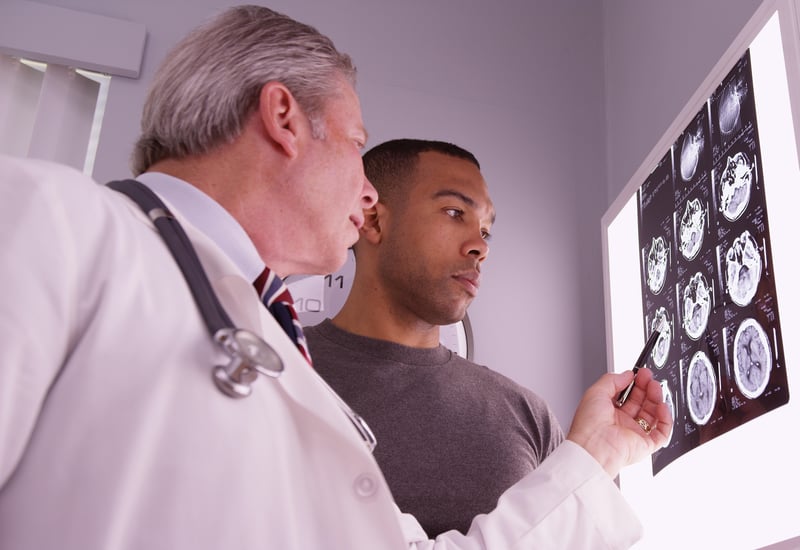Get Healthy!

- Cara Murez
- Posted June 28, 2023
Obesity Could Slow Recovery From a Head Injury
Obesity is a known contributor to a host of health risks ranging from diabetes to cancer, but new research suggests it may also delay recovery from a mild traumatic brain injury.
Why? The systemic inflammation that being obese can cause in the body may be a driving factor, according to researchers.
"This is a very understudied population related to obesity impacting outcomes,"said lead study author Shawn Eagle, a research assistant professor in University of Pittsburgh School of Medicine's Department of Neurological Surgery. "But knowing that a person with excess body fat may have a worse time can serve as a starting point for finding certain targeted treatments that may be useful to help that individual person get better."
It's well known that severe obesity impairs thinking abilities, Eagle noted.
And Eagle had observed that patients who were carrying excess body fat were having a more difficult time recovering from mild traumatic brain injuries (mTBI) while he was working in a concussion specialty clinic.
"The more I thought about it, the more it made sense. It's very well known that higher inflammation after a TBI is related to worse outcomes, and obesity is essentially an inflammatory condition,"Eagle said.
Though they are called "mild," these head injuries can cause serious symptoms. Some patients even have functional limitations a full year later.
Cognitive behavioral and physical therapies can help. Yet when a patient has prolonged brain inflammation, that can delay recovery.
Researchers studied this connection by enrolling 770 patients who had experienced mTBI within 24 hours of their injury. Enrollees included those who were obese and those who were at a healthy weight, and all were followed for a year.
The team was able to determine inflammation levels by looking at two blood biomarkers -- high sensitivity C-reactive protein (hsCRP) and interleukin protein six (IL-6) -- which are associated with increased systemic inflammation and promoting inflammation in the body, respectively.
When testing patients, the researchers discovered that those who were obese had higher concentrations of hsCRP compared to the control group at two weeks and six months after injury. They also had greater IL-6 concentration at two weeks, six months and 12 months.
Researchers also assessed patients' symptoms at six months and 12 months, finding that obese patients had prolonged issues.
The findings were published June 27 in the Journal of Neurology, Neurosurgery and Psychiatry. The research was funded by the U.S. National Institutes of Health.
"I thought it was an important paper. I think it supports our prior understanding of work in this field,"said Dr. Shouri Lahiri, director of the Neurosciences Critical Care Unit at Cedars-Sinai in Los Angeles. He was not part of the study but reviewed the findings.
Greater understanding about these issues will lead to research, funding and other mechanisms for interventions, Lahiri said.
It may also help with behavior change.
"It reinforces the advantages of a healthy lifestyle, right?"Lahiri said, noting the advantages of a good diet and exercise in helping with recovery from head injury. "It could encourage people to adhere to these types of lifestyle choices more carefully."
Could losing weight help those who are already injured?
"There are a bunch of very interesting case reports of people with severe obesity who get bariatric surgery and notice very rapid improvements in their cognitive abilities,"Eagle said. "It makes conceivable sense that reducing weight would reduce fat tissue, which would reduce inflammation. But typically people with mTBI recover on a faster course than you would take to lose weight."
Future study could look at the benefits of weight loss after mTBI, Lahiri said. He would also like to see what role exercise might play in being protective.
Although there is no evidence yet, it's possible there could be some benefit to taking natural or prescribed anti-inflammatory medications and making lifestyle improvements in diet, sleep and activity, Eagle said.
"Engaging in early exercise and reinitiating your typical routine will help people recover from this injury faster,"Eagle said.
More information
The U.S. Centers for Disease Control and Prevention has more on mild traumatic brain injury.
SOURCES: Shawn Eagle, PhD, research assistant professor, Department of Neurological Surgery, University of Pittsburgh School of Medicine; Shouri Lahiri, MD, director, Neurosciences Critical Care Unit, Cedars-Sinai, Los Angeles; Journal of Neurology, Neurosurgery and Psychiatry, June 27, 2023







